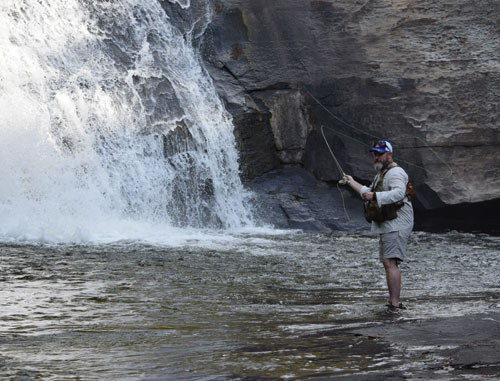Part 1 of 4: “Could I be too close…?”
By Dustin Stanberry

There are several occurrences that come to mind when thinking about poor stream etiquette and the majority of them are caused by anglers crowding one another. The fact that there is finite amount of fishable water is something that everyone should recognize. This is especially true for my geographical location, a place where the fish seem to be outnumbered by the anglers, ten to one. If we are fishing a familiar river, we generally have those spots we dream of the night before. A place we feel will produce fish. We get up early; cram breakfast down, throw the bags in the vehicle and off we go. As we approach our favorite “honey hole”, we begin to get excited and we are nervous at the same time. We don’t want to see that someone else had the same idea but, perhaps, were quicker to the draw. As we turn the bend, we are quickly deflated as we see an angler’s vehicle easily spotted by the slathering of fishing-related stickers and the rod racks. It’s what happens next that will define who we are as anglers. Do we jump out in frustration and stubbornness and rush down to the water and try to jump in front of the angler without giving thought to their space and plan of movement? We should take into account the things that pulled us to the sport of fishing, mainly peace and tranquility while on the water. Let’s face it, for most recreational anglers, fishing is about being out in nature or spending time with a friend or family on the water. My dreams of fishing are not filled with me prying open a spot to fish in a small stream full of anglers that are glaring at one another and/or yelling nasty comments across the river. That’s just not my idea of fun.
Giving an angler their space should always be at the forefront of good stream decorum. How much space is always the question. This is a grey area and will depend on the size and popularity of the water. To make things simple, I always ask myself how much space is reasonable for the given situation. I have fished rivers where there was an angler every 30 yards and was happy to have that amount of space. I’ve also fished rivers with a half-mile, or better, between anglers. In general, always try to give the widest berth possible when you can. Another factor is the angler’s plan of migration while on the water. Are they fishing upstream or working their way downstream? We don’t want to assume they are headed in any one direction before it is established. One option is to take a moment to watch the angler and decide what to do after we recognize the direction they are fishing.
I am sure this next bit may ruffle some feathers, but it needs to be discussed. A guide represents more than him, or herself. They operate at the forefront of this sport, tasked with educating upcoming and experienced anglers alike. As a guide, one may have “home water” that they feel is “their” water. This mentality often dictates the actions and attitudes towards fellow anglers in a very negative way. Some guides are just blatantly rude about it. A close friend once had a “guide” approach him while fishing and explain to him that he couldn’t fish a particular stretch of water on certain days during the week because he guided there. Bear in mind that this water is on public land. That is simply unacceptable behavior from a true guide, especially someone that chose the job as his/her profession. I have kayaked several miles to fish a grass flat, only to have a guide pole his boat so close to my location that I could smell the sunscreen from the anglers on board. Much of the time I believe this behavior happens out of spite. From a paying customer’s point of view, being with a guide with a negative attitude and not respecting other angler’s space is a very undesirable trait. Most importantly, it sets a bad example to someone that may be new to the sport. There is simply too much water for a situation like this to occur. There is a “flip side” to this coin, one that must be acknowledged from all anglers, and that is to respect the guides and their client’s space while on the water. Guides are working hard to provide a memorable experience for their clients. When an angler invades the space where a guide is working, it takes away from the experience they are working so diligently to provide. If we all participate in this type of activity, where are we headed as anglers? Where is the sport headed? And most importantly, where is the sportsmanship in that way of thinking? Perhaps a few years later, you are in the river and hear that car approaching. As the door(s) shut, you wonder if they will ask themselves “Am I too close?”